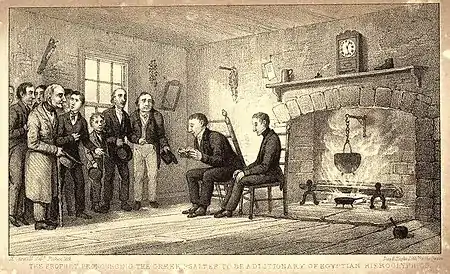The Greek Psalter Incident
The Greek Psalter Incident was a moment in the early history of the Latter Day Saint movement when Henry Caswall reported to have asked Joseph Smith to translate an old Greek psalter he had in his possession on April 19, 1842, in Nauvoo, Illinois, United States. Before meeting with Smith, Caswall was already aware of the psalter's contents and intended to use the request as a means of exposing Smith as a fraud.

History
Henry Caswall authored a book titled Three Days in Nauvoo (also called The City of the Mormons) in which he gives an account of presenting Joseph Smith, the founder of the nascent Latter Day Saint movement, with an old Greek psalter to translate. Caswall was aware of Smith's previous claims regarding the translation of the Book of Mormon and the Book of Abraham from reformed Egyptian, and wanted to test the truthfulness of these claims. The Greek psalter's contents were well-established prior to the meeting and contained a common Greek translation of the Psalms.
After looking the manuscript over, Smith identified the manuscript as being a dictionary of Egyptian hieroglyphics, pointing to the capitalized letters saying that they were hieroglyphics followed by their meanings in reformed Egyptian. Caswall went on to claim that this was evidence of Smith's position as a fraud.[1][2][3] A local newspaper, the Warsaw Message, also mentioned the event and stated that multiple supporters of Smith were also present during the event.
Smith was originally reluctant to look over the manuscript, but after he claimed its connection to Egyptian hieroglyphics the room was in "great astonish". After the excitement in the room began to cool down, Caswall revealed that the contents of the manuscript were nothing more than a common Greek psalter. Smith then "stepped out" of the room.[4]
Criticism of the event
On November 20, 1835, Oliver Cowdery gifted Smith a Hebrew and Greek Lexicon.[5] Smith also reported that he spent time studying the Greek language at home which would have been prior to his encounter with Henry Caswall.[6]
References
- "Open Facsimile 1". contentdm.lib.byu.edu. Retrieved 2019-06-13.
- "Smith History Vault: 1842 Henry Caswall booklet". www.olivercowdery.com. Retrieved 2019-06-13.
- Foster, Craig (1995). "Henry Caswall: Anti-Mormon Extraordinaire". BYU Studies Quarterly. 35 – via BYU Scholar Archives.
- "Uncle Dale's Old Mormon Articles: Warsaw Signal/Message (1843)". www.sidneyrigdon.com. Retrieved 2019-06-14.
- Jessee, Dean; Esplin, Ron; Bushman, Richard Lyman (2008). The Joseph Smith Papers: Journals, Vol. 1: 1832–1839. Church Historian's Press. p. 107. ISBN 1570088497.
- Jessee, Dean; Esplin, Ron; Bushman, Richard Lyman (2008). The Joseph Smith Papers: Journals, Vol. 1: 1832–1839. Church Historian's Press. p. 135. ISBN 1570088497.
Further reading
- The City of the Mormons; or, Three Days at Nauvoo, in 1842 at the Internet Archive
- The Prophet of the Nineteenth Century; or, The Rise, Progress, and Present State of the Mormons, or Latter-day Saints, To Which is Appended an Analysis of the Book of Mormon at the Internet Archive